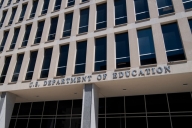You have /5 articles left.
Sign up for a free account or log in.
The federal government needs to do a better job of overseeing the companies it hires to service student loans, especially Sallie Mae, according to a new report by the National Consumer Law Center.
“The growing number of government investigations and consumer complaints show that government supervision has been lax at best,” the report says of Sallie Mae, the largest player in the private student loan market and student loan servicing industry.
The company is facing investigations from three federal agencies and disclosed to investors last week that it had set aside $70 million for “expected compliance remediation efforts related to pending regulatory inquiries.” The company’s chief executive officer said in a call with investors that he did not anticipate any changes to its business practices as a result of those investigations.
The report released Tuesday, by the NCLC staff lawyer Deanne Loonin, urges federal and state regulators to coordinate their oversight of student loan servicers and hold servicers accountable for poor performance. It praises the Consumer Financial Protection Bureau’s decision to more closely monitor the nation’s largest student loan servicers, which are companies that process borrower payments on behalf of a lender.
Specifically, the report calls on the Education Department to change how it allocates federal student loans to contracted servicers. Instead of evaluating the servicers based, in part, on the number of borrowers who avoid default, the department should also measure servicer performance based on the ways in which they help borrowers avoid default.
“We consistently see examples of Sallie Mae and other servicers pushing borrowers into the quickest options, such as forbearance, rather than explaining and assisting borrowers to obtain more favorable long-term solutions, such as income-based repayment,” Loonin writes. “Forbearances can be costly for borrowers because interest accrues during forbearance periods and because they must be renewed more frequently than most other options.”
Sallie Mae scored the lowest of the four main federal loan servicers during the department’s most recent evaluation. As a result, the company will be receiving the lowest number of accounts this year.
However, Sallie Mae performed the best on the department’s current default prevention metric, which the company is pushing to have more heavily weighted against the other metrics, according to a call with investors. Sallie Mae and the other three student loan servicers are currently negotiating with the Education Department over its loan servicing contract, which expires this summer. The department has indicated that it intends to renew those contracts.
A representative for Sallie Mae took issue with the NCLC report.
"This is an unfortunate, inaccurate picture of the good work our 7,500 employees do to help customers,” said Patricia Christel, a company spokeswoman. “Plain and simple, we only succeed when our customers succeed."
The NCLC report comes as other organizations have stepped up their criticism of how the Education Department oversees its federal student loan servicers.
An Education Department spokesman declined Tuesday to comment on the report.
Sen. Elizabeth Warren last year wrote to the Education and Treasury Departments with concerns about the company. A group of student advocates, union leaders and the American Association of State Colleges and Universities last month urged the Education Department to review the “poor servicing and collection practices of Sallie Mae.”
More broadly, Tuesday’s report also calls for changes to the private student loan market -- which top Obama administration officials met earlier this month with the heads of the largest players in the private student loan industry to discuss. Consumer Financial Protection Bureau Director Richard Cordray has said that the industry “can and should do more to offer more affordable repayment options so borrowers can avoid default.” A group of Senate Democrats is pushing legislation by Sen. Richard Durbin of Illinois that would increase regulation of private student loans and how companies service those loans.




